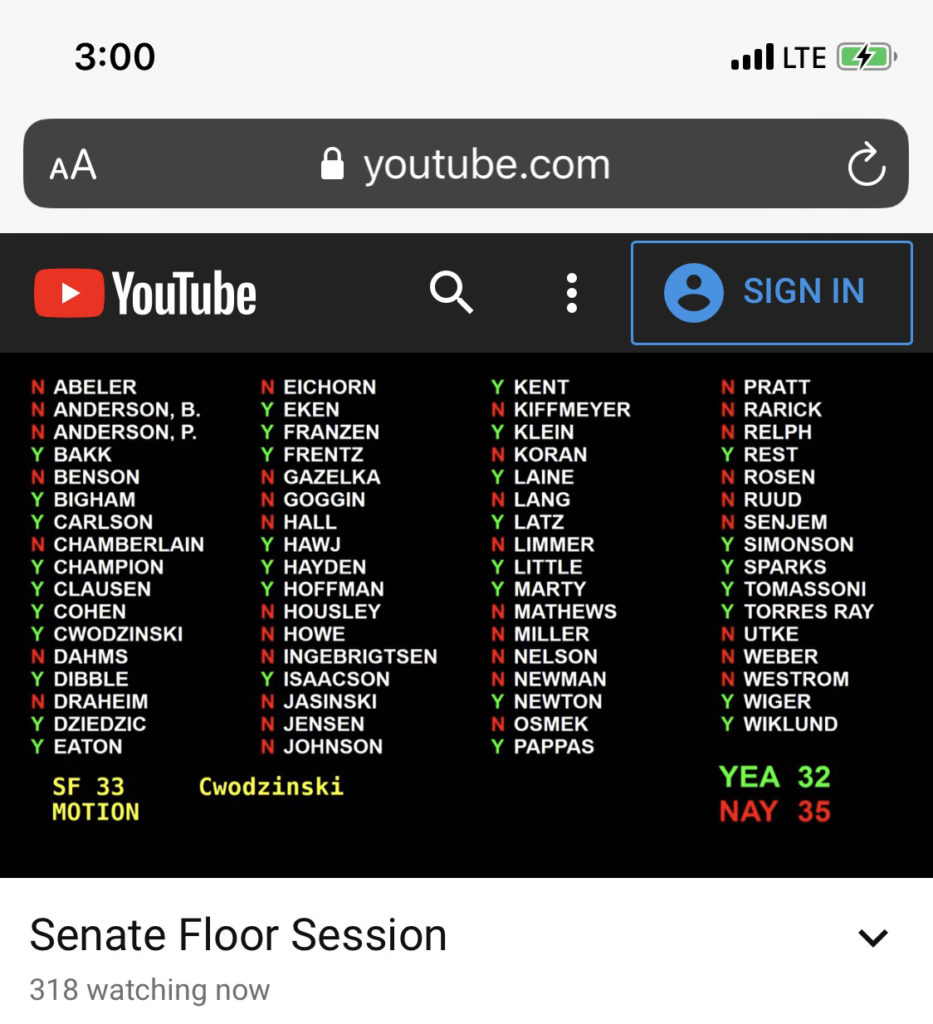
Senate votes 35-32 against; House waits
Click here to see video (go to 2-hour-22-minute mark)
Click here for a story describing the debate. “Senate debate filled with questionable claims”
By Tim Engstrom
ST. PAUL — The Minnesota Legislature shot down the Veterans Restorative Justice Act in the second special session of 2020, leaving veterans organizations and the attorney community bewildered at lawmakers’ actions.
In a nutshell, the House waited to see whether the Senate would pass it.
“It will pass in the House,” said Rep. Rob Ecklund of International Falls, chair of the Veterans Affairs Committee.
The Senate floor took up the bill July 20, debated whether to skip the committee process, and then voted 35 against, 32 for.
Everyone in St. Paul thought police reform would happen in August and the bonding bill would happen in July. Instead, the bonding bill went nowhere, and police reform passed.

“Looking back,” said Tommy Johnson, legislative officer for the Minnesota Veterans of Foreign Wars, “we should have included it in the policing bill, but we didn’t because they told us they were not going to pass it. We got screwed every which way on this one. They tell you they are going to do something, and they don’t, and they tell you they are not going to do something, and they do.”
Johnson was acting on behalf of the VFW but also the Minnesota Commander’s Task Force, which includes The American Legion, Paralyzed Veterans of America, Disabled American Veterans, American Veterans, Jewish War Veterans, Vietnam Veterans of America and Military Order of the Purple Heart. Several have passed national resolutions in favor of veterans treatment courts. The American Legion National Executive Committee passed it in 2016 at the National Convention in Cincinnati.
Amy Koch, the former Senate Majority Leader who is a lobbyist for the Minnesota Association of Criminal Defense Lawyers, said several organizations in the state’s legal industry support the bill, too.

“What happened is not too clear,” she said. “The bill has been in the works for several years, and it has support from both sides.”
Koch, an Air Force veteran, said the bill has been thoroughly combed over. If there is a piece of the bill that needs revising, then she would like lawmakers to let her know.
“Tell us what to do, not reasons not to do it,” she said.
Sen. Roger Chamberlain, a Legion member who introduced the bill in the Senate last March, advised his colleagues to vote against it on July 20, saying he would like the measure to have its hearing in the Senate Judiciary Committee in the 2021 regular session. (See related story.)
Though the bill has long-term savings, counties choosing to implement veterans courts would have upfront costs, and he would like to hear from the state Supreme Court, he told the Legionnaire. As a practical matter, he didn’t like the idea of passing it during a special session.

Will it pass in the 2021 regular session?
“I have no doubt in my mind that it will,” Chamberlain said. “We have the attention now on the bill, and it shouldn’t be a problem to get across the finish line.”
Vets organizations still hold out hope for the August session.
VRJA background
Veterans treatment courts have existed in Minnesota as a pilot since 2008. This state, along with Buffalo, New York, were pioneers in the USA.
They now exist in 27 of the state’s 87 counties. They allow judges to hold pleas and instead send a veteran facing criminal charges — and if the action can be tied to combat trauma or other military-related trauma — to get treatment instead.
Instead of the government paying tax dollars to lock up a veteran and mark them for life as a criminal, this helps them return to being productive, tax-paying citizens.
The measure failed in 2019. It was introduced and passed multiple committees in the House. In the Senate, it passed the Veterans Affairs Committee, then forwarded to the Judiciary Committee, where it was never heard.
Because it passed the House that session, it was debated in Conference Committee for inclusion in a tax-finance bill, and House members voted 4-0, with 1 abstaining, and senators voted 4-1 against it. It died.
During that session, Minnesota Management and Budget produced a fiscal note that said it would save $1.3 million in the first two years and $2.3 million the next two years.
What about the cost of the treatment? It might be paid by the military, the VA system, private-funded programs or even the defendant, all depending on the situation. The court system isn’t picking up the tab.
“A normal court system is adversarial by definition,” Johnson said “A veterans court is non-adversarial by definition. Prosecutors and defense attorneys are not looking for a win. They are looking for what’s best for a veteran, and that’s what the Senate turned their backs on.”
Walz promise falls flat
On March 2 of this year, House Veterans Affairs Committee heard the bill, approved it and referred it to Ways and Means. The House Judiciary Committee heard it, too, amended and approved it, and referred it to Ways and Means.
Then COVID-19 struck and the Legislature entered a five-week hiatus. When it returned, lawmakers focused on pandemic bills.
Then there was a first special session. Nothing doing.

The vets organizations of the CTF were upset they weren’t getting access to lawmakers. They pushed for a video conference with House and Senate leaders. Instead, they had one with House Reps. Rob Ecklund of International Falls and Bob Dettmer of Forest Lake, both are Legion members and leaders of the House Veterans Affairs Committee, on June 16. Then CTF members had a video conference with Gov. Tim Walz, also a Legion member, on July 10.
“There are few groups that I value their opinion more,” the governor said.
Walz apologized for not meeting with the veterans more frequently and pledged to come to CTF meetings once a quarter. The CTF members had a single request: Help the CTF get the VRJA passed.

How? The CTF asked Walz to publicly call out the Senate majority to pass this bill and save taxpayer money and to send it out in the governor and lieutenant governor email newsletters. Walz had a staff member acknowledge the request.
“This should have been done last year,” Walz said.
Johnson said Walz neither called out the Senate nor used his bully pulpit to advance the legislation in any way. The governor did mention it briefly in one email newsletter.The second session began July 13, and Ecklund introduced the bill in the House. Rep. Sandra Masin of Eagan signed on the next day. Dettmer signed on July 20.
On July 14, the Star Tribune published a story on veterans organizations pushing for the legislation. The headline was “Vets make special push to expand veterans courts statewide.” With stories of how the legislation gave veterans renewed leases on life, it raised the issue’s profile.

One tale was a 70-year-old former Army major from Shoreview who once tried to commit suicide by cop after a six-year illness. He said every day the Legislature waits is a mistake.
“It’s been a political football long enough,” he said.
Todd Kemery, chairman of the CTF, said, “I urge you to contact your elected official to support your hometown veterans and demand the Veterans Restorative Justice Act is instated.”
See the CTF public statement here.